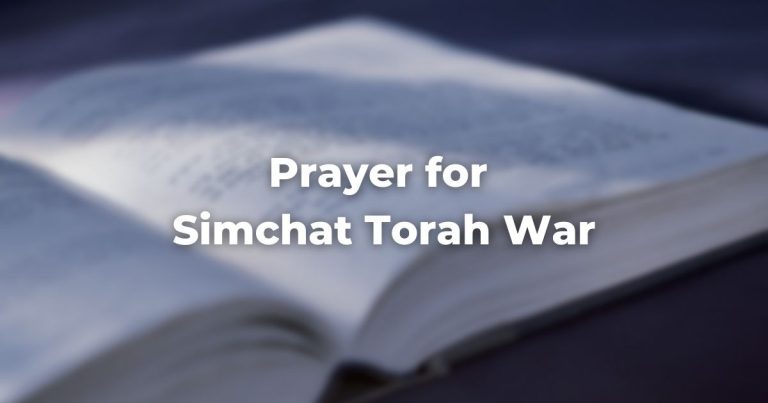Table of Contents
What is Shivah?
The word shivah (shiva) means “seven” in Hebrew and refers, at least in the context of the laws of mourning, to the seven days of mourning that follow the burial of a parent, child, sibling, or spouse.
(The observance of this week of formal mourning is known colloquially as “sitting shivah.”)
Only the so-called seven relations listed above (mother, father, sister, brother, son, daughter, and spouse) are required to observe the laws of shivah, but, at least within the Conservative movement, it is generally accepted that adopted children too should sit shivah for their adoptive parents.
The same would apply to stepparents, half-siblings and step-siblings.
Traditionally, conversion to Judaism presumed that the convert’s ties to their non-Jewish family were severed, but this is rarely the case today.
The norm today is for such an individual to arrange a funeral for a deceased non-Jewish parent that adheres to the religious traditions the deceased maintained in their lifetime and then, after burial, to observe the normal practices of shivah as one normally would for a Jewish parent.
The advice of a rabbi should be sought in determining precisely how to participate in a dignified and meaningful way in a non-Jewish funeral without contravening the halakhic standards that forbid active participation in the religious rituals of other religions.
The general principle in counting the days of shivah is that a part of a day counts as the whole day.
Thus, one counts the remainder of the day of burial as the first day and it is normal only to observe the laws of shivah briefly on the seventh day.
The decision on the part of some moderns to return to work after only three days of shivah should be countenanced only in cases of extreme financial hardship, and even then the work permitted should be done as privately and modestly as possible (Shulchan Arukh, Yoreh Deah 380:2).
Otherwise, ignoring the end of the shivah week can neither be sanctioned by halakhah nor considered at all advisable from the perspective of the healing process that must follow loss.
The shivah period begins immediately after the interment.
If a festival falls during the shivah period, shivah is terminated before the holiday and not resumed afterward (Shulchan Arukh, Yoreh Deah 399:1).
It is customary to light a seven-day candle and to let it burn throughout the shivah week. In the case of a shivah week cut short by a festival, the candle should be allowed to burn for the full seven days.
If the death occurs on one of the days of Rosh Hashanah, Passover, Shavuot, or Sukkot, or on Yom Kippur or one of the intermediary days of Passover or Sukkot, shivah is not begun until after the festival ends even if the burial itself has already taken place (Shulchan Arukh, Yoreh Deah 399:2).
Therefore, even if the burial takes place during one of the intermediary days of Sukkot or Passover, or on the second day of a festival—or even, in extreme circumstances, on the first day—the week of bereavement only begins after the festival.
Shivah should be observed in the home of the deceased or the home of the mourner.
Although there is value to sitting together as a family, shivah may also be observed in separate homes.
During the shivah week, mourners remain at home and should not leave the house except for emergencies or to attend religious services.
In many communities, daily services are held in the house of mourning precisely so that the mourners do not have to leave. If a minyan cannot be arranged for the house of mourning, the mourner may then go to the synagogue to say Kaddish, but must then immediately return to the house of mourning.
The week of mourning is a time for quiet reflection, for remembering, and for beginning to work through grief.
None of this can take place if the mourner is preoccupied with worldly affairs. As mentioned above, mourners should not go to work during shivah unless severe economic loss will result. If one must go to work, one should resume sitting shivah upon returning home.
Individuals who work at home may not pursue their normal activities during the shivah week either.
Customs during Mourning
Although the custom lacks a real halakhic basis, there is a widespread practice to cover up the mirrors in a house of mourning.
The reasons given for this are basically threefold: to free the mourner from inappropriate fretting about their own appearance, to encourage the mourner to focus on the deceased, and, as one is not supposed to pray in front of a mirror, to aid those who come to participate in services in the house of mourning.
As mentioned earlier, it is widely customary to light a seven-day candle in the house of mourning.
This candle should be allowed to burn itself out, even if that means that it continues to burn after the formal observance of shivah concludes.
If there is more than one house of mourning, a candle should be lit in each house. If one does not have a seven-day candle, individual yahrtzeit candles may be lit daily during the mourning week.
No blessing is recited when the shivah candle is lit.
Upon return from the cemetery, a meal called a se’udat havra·ah (“a meal of healing”) should be served in the house of mourning by friends and relatives who are not mourners themselves.
It is customary to serve hard-boiled eggs as part of the menu since the eggs are deemed symbolic of the cycle of life. (Another reason often given is that since eggs are the only food that becomes harder, not softer, when cooked, they are deemed symbolic of the way in which human beings can become stronger, not weaker, by encountering adversity, sadness, and loss.)
Other traditional foods served in some houses of mourning are lentils and wine. The drinking of wine at the house of mourning is probably based on Proverbs 31:6, “Give strong drink to the hapless, and wine to the embittered.” In the TalmudReferring to one of two collections, the Jerusalem and Babylonian Talmuds, edited in the 6th century, that contains hundreds of years of commentary, discussion, and exploration of the ideas in the Mishnah. One could describe it as Mishnah + Gemara = Talmud at BT Eruvin 65a, Rabbi Ḥanin goes even further and says that “wine was created only for the purpose of comforting mourners.”
The mourners should sit on low benches or boxes during the shivah period as a sign of mourning.
Also, they should not wear leather shoes during the shivah period, nor are married couples permitted to engage in intimate relations during the week of bereavement (Shulchan Arukh Yoreh Deah 383:1).
Mourners should not cut their hair during shivah, nor shave (Shulchan Arukh, Yoreh Deah 390:1).
A somber atmosphere should prevail in the house of mourning.
Mourners should not watch television or listen to music. In times of national or public emergency, however, one may watch or listen to news broadcasts.
All public displays of mourning other than the public recitation of Kaddish are suspended on Shabbat, and this includes wearing the torn garment or the mourner’s ribbon. However, the rules that govern private mourning, such as the prohibition of intimate relations, remain in effect (Shulchan Arukh, Yoreh Deah 400:1).
Traditionally, mourners do not enter the Friday evening service until just after L’khah Dodi, at which time they are welcomed into the synagogue with the traditional words of comfort: ha-makom y’naḥeim etkhem b’tokh she·ar aveilei tziyyon virushalayim (“May God comfort you among the other mourners for Zion and Jerusalem”).
If the parent of someone about to get married should pass away immediately before the wedding, the wedding may continue even immediately following burial.
If such a wedding takes place during what would normally be the shivah week, the couple may consummate their marriage, but they must then separate until the end of the shivah week (Shulchan Arukh, Yoreh Deah 383:2).
Delayed News of Death
If news of the death of a relative for whom one would normally mourn only comes more than thirty days after that person’s death, then the custom is to observe a kind of abbreviated shivah that lasts for an hour and features only the obligation not to wear leather shoes.
Nor, unless the sad tidings regard the death of a parent, is the mourner obligated to rend his or her garment.
If, however, the news of a relative’s death comes within the thirty day period, the regular week of mourning commences with the arrival of the sad news, as does sh’loshim (Shulchan Arukh, Yoreh Deah 402:1–2).
Miscarriage
Traditionally, there are no mourning rituals at all for potential parents when a woman suffers a miscarriage.
Although this law was no doubt meant as a kindness, today many people yearn for ritual framework to deal with the loss.
Rabbi Debra Reed Blank, in a responsum concerning miscarriage approved by the CJLS in 1991, wrote that although the halakhah does not sanction responding to such a loss with the traditional rituals of mourning, we should instead consider the grieving couple to be stricken and respond much in the same way tradition ordains that we respond to sick individuals.
Rabbi Amy Eilberg, in a dissenting response, rejected the notion that a couple that has suffered a miscarriage should be treated as though they were ill and instead suggested that the rituals of mourning be modified and applied to help them through their grief, and she included among those rituals the tearing of a garment, the serving of a formal meal of consolation, the observance of a day of sitting shivah, and the recitation of Kaddish for 30 days.
Rabbi Stephanie Dickstein, in a 1996 responsum also approved by the CJLS, recommended in the case of a stillbirth that a funeral service be held, followed by a one-day observance of shivah.
Adapted with permission from The Observant Life.
Authors
-

-



The Observant Life: The Wisdom of Conservative Judaism for Contemporary Jews distills a century of thoughtful inquiry into the most profound of all Jewish questions: how to suffuse life with timeless values, how to remain loyal to the covenant that binds the Jewish people and the God of Israel, and how to embrace the law while retaining an abiding sense of fidelity to one’s own moral path in life. Written in a multiplicity of voices inspired by a common vision, the authors of The Observant Life explain what it means in the ultimate sense to live a Jewish life, and to live it honestly, morally, and purposefully. The work is a comprehensive guide to life in the 21st Century. Chapters on Jewish rituals including prayer, holiday, life cycle events and Jewish ethics such as citizenship, slander, taxes, wills, the courts, the work place and so much more.
View all posts





